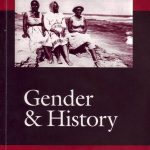 Gender & History; Editors of the special issue: Tracey Deutch, Heidi Gengenbach, Amanda Herbert and Shauna Sweeney (Web)
Gender & History; Editors of the special issue: Tracey Deutch, Heidi Gengenbach, Amanda Herbert and Shauna Sweeney (Web)
Proposals by – extended: 15.10.2020
Gender & History is an international journal for research and writing on the history of femininity, masculinity and gender relations. This Call for Proposals is aimed at scholars studying any country or region, and any temporal period, including the classical, medieval, early modern, modern and contemporary periods.
This Special Issue will examine the ways that the expansive categories of food, gender and sovereignty have intersected over time, shaped by each other and by specific historical circumstances.
Sovereignty and food are intimately entwined. Food has been an instrument of both power and empowerment, a site of negotiation for control of bodies, spaces, states, institutions, identities and the self. What happens in the places food is bought and sold, produced and consumed, imagined and discussed, shapes outcomes and possibilities for historical actors and systems. Food reveals the complexity of relationships among those who assert, retain, lose, reject or attempt sovereign control, whether colonised or coloniser, bound or free. Sovereignty is an expansive category, incorporating not only the consolidation of formal political entities, but also the non-elite, everyday politics of survival and self-determination. We see sovereignty as encompassing the formal claims of governments over land and peoples, and also the ways that individuals, collectives and communities assert control over resources. Whether directed at bodies or abstract polities, sovereignty and food have historically informed one another.
Food is similarly capacious, including liquids, solids and matter that, like Jell-O, refuses easy binaries. It consists of substances considered nourishing and poisonous, is inextricable from medicine, and is absorbed into the body through many means. Food is tied to many needs: budgetary, cultural, economic, emotional, financial, physiological, political, psychological, sacred, sexual, social. Its multidimensional nature makes it both quotidian and extraordinary.
Historically, questions of food and sovereignty have been worked out through gender, which is itself always co-constructed by race and class. Food has been central to gendered regimes of power and the labour that has maintained or undone them (e.g. early modern European „grain riots“; the use of human milk as Continue reading →
 Akademie der bildenden Künste Wien (Web)
Akademie der bildenden Künste Wien (Web)



